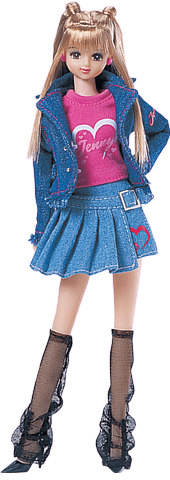
Jenny (doll)
Encyclopedia

Fashion doll
Fashion dolls are dolls primarily designed to be dressed to reflect fashion trends. They are manufactured both as toys for children to play with and as collectibles for adult collectors. The dolls are usually modeled after teen girls or adult women, though child, male, and even some non-human...
produced by Japanese toy company Takara
Takara
Takara Co., Ltd. was a Japanese toy company founded in 1955, that merged with another prominent Japanese toy company, Tomy Co., Ltd., on March 1, 2006 to form Takara Tomy, also known in English as TOMY Company Ltd....
since 1982. The doll was originally known as the Takara Barbie, but became "Jenny" in 1986 after Takara ended their licensing agreement with Mattel
Mattel
Mattel, Inc. is the world's largest toy company based on revenue. The products it produces include Fisher Price, Barbie dolls, Hot Wheels and Matchbox toys, Masters of the Universe, American Girl dolls, board games, and, in the early 1980s, video game consoles. The company's name is derived from...
. The differences between the Takara Barbie and the Western Barbie
Barbie
Barbie is a fashion doll manufactured by the American toy-company Mattel, Inc. and launched in March 1959. American businesswoman Ruth Handler is credited with the creation of the doll using a German doll called Bild Lilli as her inspiration....
are that Takara Barbie was altered to suit Japanese preferences. Takara Barbie is shorter, her eyes are less round, the mouth is closed, and the doll's figure is less mature than the Western Barbie's. Takara Barbie did not sell very well, and sold better after she was renamed Jenny. Like her Western counterpart, Jenny wears a large variety of outfits, which often include street fashion
Street fashion
Street fashion is a term used to describe fashion that is considered to have emerged not from studios, but from the grassroots. Street fashion is generally associated with youth culture, . Japanese street fashion sustains multiple simultaneous highly diverse fashion movements at any given time....
, school uniforms
Japanese school uniform
Japan introduced school uniforms in the late 19th century. Today, school uniforms are common in many of the Japanese public and private school systems. The Japanese word for this type of uniform is .-Usage:...
, kimono
Kimono
The is a Japanese traditional garment worn by men, women and children. The word "kimono", which literally means a "thing to wear" , has come to denote these full-length robes...
s, and other uniquely Japanese costumes, such as "Bullet-Train Stewardess Jenny". Today the Jenny doll is a sentimental favorite doll in Japan, but she is much less popular than Licca-chan
Licca-chan
, full name , is a very popular dress-up doll series introduced in Japan on 1967-07-04 by Takara, enjoying the same kind of popularity in Japan as the Barbie series does in the United States. The Licca-chan dolls tend toward a more Japanese body as far as height and features. Takara had sold over...
, Mattel's Barbie or MGA Entertainment's Bratz
Bratz
Bratz is an American line of fashion dolls and merchandise manufactured by MGA Entertainment. Four original 10" dolls were released in 2001 - Cloe, Jade, Sasha and Yasmin...
dolls.
Name
Prior to 1986, the doll was known as Takara Barbie. In 1986 Takara ended their licensing agreement with MattelMattel
Mattel, Inc. is the world's largest toy company based on revenue. The products it produces include Fisher Price, Barbie dolls, Hot Wheels and Matchbox toys, Masters of the Universe, American Girl dolls, board games, and, in the early 1980s, video game consoles. The company's name is derived from...
, and, as they owned the rights over the Takara Barbie's design, came up with a new name for the doll. The explanation given for the name change was that Jenny was the name of a character Barbie portrayed in a play, also titled Jenny. The play was a success and Barbie had become so associated with her character's name that she decided to change it to Jenny. Jenny's boyfriend was renamed from "Takara Ken" to "Jeff".
Further reading
- "Kawaii! JeNny". Newtype USA 6 (12) 12. December 2007. .

